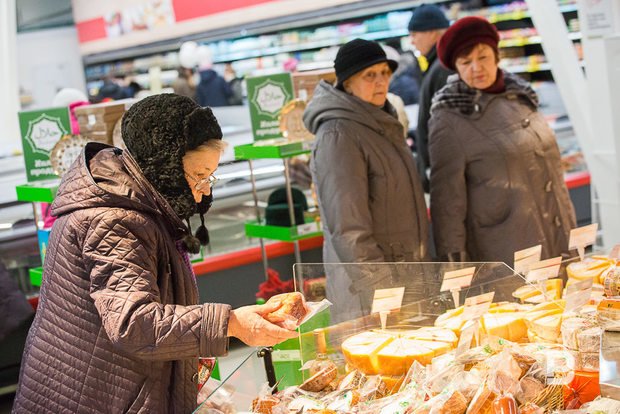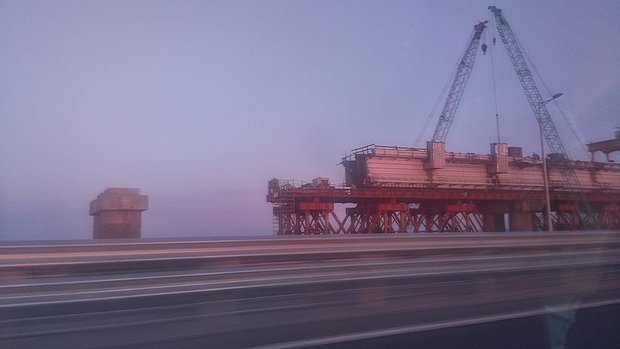''The rhetoric starts to differ from practice: we got off our knees but why do we have little money?''
Interview with political expert Dmitry Oreshkin. Part 2
How much time Russians will need to realise the dead end of the current political and economic model; who, if not Putin, in the Russian elite supports the strategy of the ''gathering of the lands''; if the talks about a possible dissolution of Russia have foundation among experts – Dmitry Oreshkin told about it in the second part of his interview with Realnoe Vremya. The first part is available here.
''It was believed in the USSR we're ahead of the curve, but people asked: ''Why don't we go ahead of the USA?''
Mr Oreshkin, how much will the authoritative situation of the country on the world stage created by their respected president smooth people's problem if they don't eat enough, that's to say, if their fridge isn't full?
If people already don't eat enough, it's Putin's main problem. The vertical of power easily generates ''small victorious wars'', easily generates a lot of propaganda, it easily makes people who are concentrated on key areas – the Federation Assembly, the State Duma, enterprises that began to walk on their tiptoes a long time ago – disciplined. Well, fine, leave pensioners aside, when there isn't enough money for workers, let's also leave them aside. But when there isn't enough money for elitist citizens, it's already an economic trouble.
But a good number of citizens supports Putin. 76% voted for him in the last election.
And 99% voted for Brezhnev! By the way, I don't think Putin got 76%. He got some 63% in fact: in this election, all worked for him. And if Putin hadn't got enough points, somebody could have lost their position of the head. This is why people were forced to go to vote and so on. And if there were an acute situation in the country like in the late 80s, no effort would be put to support Putin.
But 63% isn't little either. Is it probably a fear of some future serious economic troubles and trust in Putin in the fight against them as a reliable politician?
There is a series of reasons here. It's both a fear and Crimea where we forced someone, though people forget Putin lost Ukraine. Propaganda also works well. People are told if not Putin, a NATO base would be in Crimea. But it's rubbish. If the country isn't a NATO member, NATO won't have its bases there, while NATO ships can't stay for more than three weeks there, according to the Montreux Convention. Now Putin is a reflection of the cognitive dissonance, that's to say, ''Who if not Putin?'', ''No Putin – no Russia'', ''Putin – Source of Our Victories'', ''If not Putin, we will all be smashed, enslaved and divested of sovereignty''. These are talks. It was believed in the USSR we're ahead of the curve, the hope of advanced humankind and so on, but people asked: ''Why don't we go ahead of the USA?'' And now the rhetoric in Russia starts to differ from practice – it seems we got off our knees, we conquered Crimea, humiliated the Americans, but for some reason, we have little money, why are prices high, why is benzene becoming expensive, why are pensions low?

''If people already don't eat enough, it's Putin's main problem.'' Photo: Maksim Platonov
''It will take some five-six years for the Russians in both Moscow and regions to understand the current political and economic model is a dead end''
Many political experts, opinion journalists, bloggers who are critical about President Putin suppose for some reason the people can be fed up soon, and little time left for current power to rule. But when will citizens finally seriously evaluate politics and the economic course of the country's authorities?
Oh, I wish I knew the answer. Putin's critics are weak in this respect. They realised this cognitive dissonance a long time ago, they think Putin is an unsuccessful manager, who goes too far and so on. And it seems to them it's child's game. They write Putin got additional 10 million votes in the last election. But, sorry, the other 40 million are honest! Economic Mikhail Dmitriev wrote after the first protest in Bolotnaya Square in Moscow that Putin's regime would collapse in 2012, Andrey Piontkovsky expected Putin's power to fall in 2013. They don't like to remember their forecasts now. But it was declaimed. It seemed to me at that moment it was the costs of the Moscow intelligentsia, while I'm a geographer, I've travelled across the country more and understand better how it works in fact.
It will take some five-six years for the Russians in both Moscow and regions to understand the current political and economic model is a dead end. Pay attention to Vladimir Putin's rating – it is rapidly falling; people don't understand why power decided to change the future of their pension affairs when taxes, prices, benzene started to grow, while the quality of products doesn't improve. As information transparency is high now, people exchange simple, human observations. They tell each other what has become expensive, how much it's risen, they tell someone has been dismissed, and the person is 63 years, they say an average wage in Latvia has already reached €900, while oil-rich Russia has €500, and not everywhere. Previously, in the USSR, it was kept in secret, these topics weren't discussed in public, while now they are discussed. And this is why the falling efficiency of the economy will come to the surface anyway – same needs of people are inclined to grow. Yes, TV is winning over the fridge now, but only in the short distance, it's losing in the long one. What's the length? Several years, I think.
''If we want centralisation like in the USSR, regions will be underfed''
The next anniversary of the coup in 1991, which failed but at the same time accelerated the dissolution of the USSR, will be on 19 August. Putin considers the dissolution of the USSR a geopolitical catastrophe, and some people think he'd like to revive the Union, maybe with the name ''Eurasian''. Do you think he would really like to rule a country with Belarus, Kazakhstan, Kyrgyzstan in it? Because the lands are gathered – Crimea is Russian, Abkhazia with South Ossetia are within Russian influence.
I have no doubt he would like to. I don't think he wants it personally: it's an interest of a group of the new political elite that came together with Putin, such people as Sergey Ivanov, Igor Sechin, Vladimir Yakunin. They are focused on expansion. It seems to them the more territories they control, the more Russia is respected. This makes sense.
But I want to pay attention to another thing. Putin only virtualised the USSR! What is South Ossetia? It's a ''little toe'' that was thrown over the Caucasian range. What is Abkhazia? It's a ''black hole'' that needs money to be invested in like South Ossetia. What is Crimea? It's what needs to be paid 100 billion rubles a year with costs on the bridge, with costs for sanctions. It means there won't be paid additional money to Yakutia's budget for a needed bridge across the Lena River. And that Russia lost Ukraine is allegedly an evil intrigue of the Americans. But people don't talk about it!

''What is Crimea? It's what needs to be paid 100 billion rubles a year with costs on the bridge, with costs for sanctions. It means there won't be paid additional money to Yakutia's budget for a needed bridge across the Lena River.'' Photo: Aydar Sagdeyev
When talks about a possible dissolution of Russia appear among experts, do people rather scare citizens or is there any sense?
No, they don't scare. We already mentioned with you the dissolution of the USSR injured few people in 1991. People said: ''Why the hell do we need this Tadzhikistan, we need goods in the shop''. And now people start to miss Tadzhikistan again. In the virtual space, Putin really strengthens the country. But, as a geographer, I think he's laying foundation of his further weakness. Why? The transport infrastructure of regions doesn't almost develop, if so, there is a gap in Siberia and the Far East. People can't afford a flight to Moscow.
Not transport infrastructure is the problem – it has always been so in Russia. The worst thing is that we don't have alternative economic growth centres. Resources are too centralised in Russia. And these resources aren't used for the citizens' well-being but the solution of problems of the vertical. In the USSR, these tasks were military (they are gradually becoming military too now), money was spent on rockets, submarines, and, for instance, regions were on the second, fifth, sixth place like ''what will happen to them, they won't disappear''. And now we are making the same mistake that the USSR did. If we want centralisation like in the USSR, regions will be underfed.
Let's remember, indeed, we had 25 donor regions in the poor 90s, and now we have only 10, including your Tatarstan. The verticalisation will go on, there will be presupposed a risk of a very steep and close dissolution of the country. Without having institutions eliminating such risks, which pay attention to difficulties and make respect them – the strong Federal Assembly, strong governors – the country has accumulated domestic contradictions. And everything collapses one day. This is how it happened in the republics of the Union on the eve of the USSR's dissolution.